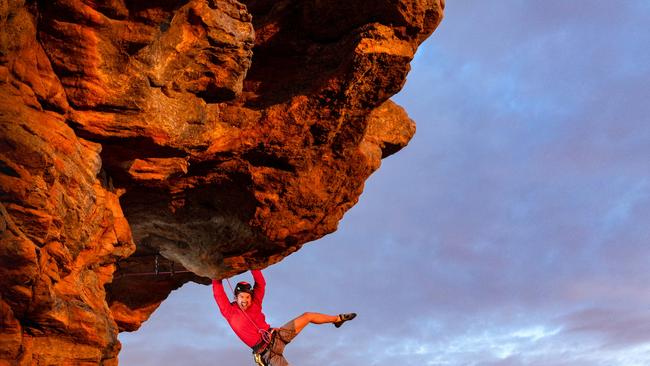Arapiles climbing ban ‘risks exodus of doctors, nurses and lawyers’
The bungled handling of Mount Arapiles rock climbing bans has sparked demands for bureaucratic relief and a meeting with First Nations people.

The bungled handling of rock-climbing bans at Mount Arapiles has sparked fears of a flight of doctors, nurses and psychologists from Victoria’s Wimmera region and demands that the Allan government consult with key stakeholders.
The Horsham Rural City Council is seeking a three-month extension to the consultation process over the new management plan at Mount Arapiles, which has been one of the world’s most revered rock-climbing sites.
However, the decision to ban climbing at more than half of the rock, also known as Dyurrite, has prompted concerns the nearby town of Natimuk, 330km northwest of Melbourne, will also be gutted because of its economic reliance on climbing.
The council has voted to invite the Barengi Gadjin Land Council to meet with it to discuss future preservation of the mountain and form a reference group representing a diverse range of users to help oversee the implementation of the new management plan.
This week’s council meeting heard concerns from three councillors about the impact of the changes, backed by Parks Victoria, which will change forever the way the state park is used.
It comes after a secret process where cultural heritage has been assessed and environmental values examined, leading to wholesale bans at the site, which was once used as a rifle range and grazed bare.
Councillor Brian Klowss said the Wimmera relied on climbing to bolster the ranks of essential services, with six doctors, two psychologists, five nurses, three engineers and 13 teachers among the ranks of trained people who were in the area to climb.
Mr Klowss warned the planned cuts could be devastating for Natimuk, population 548, with up to half the community relying on the mountain. “The flow-on effects to Horsham and the greater Wimmera communities are massive,’’ he said. “And potentially unrepairable.’’
He said the trained workers were in the community because of their love of climbing and the “great outdoors”, and that Parks Victoria’s decisions would have a material impact. He added that the Climbing Company in Natimuk employed 52 guides and that the CFA had a 60 per cent climbing membership.
Two other councillors raised concerns and the council voted unanimously for a fairer process.
It comes as the federal Liberal member for Wannon, Dan Tehan, told parliament the bans were a disgrace.
“You’d think that, if there was a need to protect something for cultural heritage, you’d be able to do it in balance in a unique rock-climbing part of the globe where people from overseas go there to rock climb,’’ he said.
“Yet the wherewithal of the Allan Labor government meant they did nothing of the sort. What they did was just say ‘no’ without any consultation.
“The Allan Labor government needs to have a good hard look at itself, because simply shutting something down without consultation, especially without consultation of the rock-climbing industry, is a disaster. People have built businesses around it. People have come to live in that area so they can climb Mount Arapiles. Yet what did the Allan Labor government do? They just shut it down.’’
Parks Victoria is backing the shutdown of climbing at half of Arapiles without having properly consulted with climbers.




To join the conversation, please log in. Don't have an account? Register
Join the conversation, you are commenting as Logout